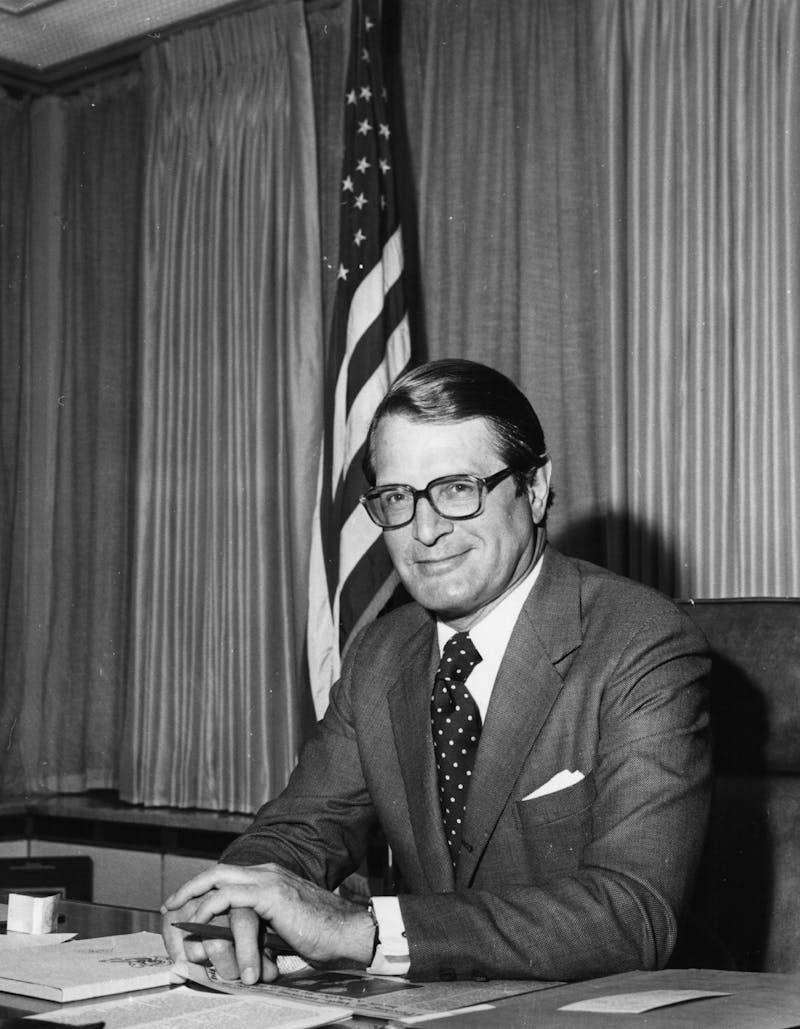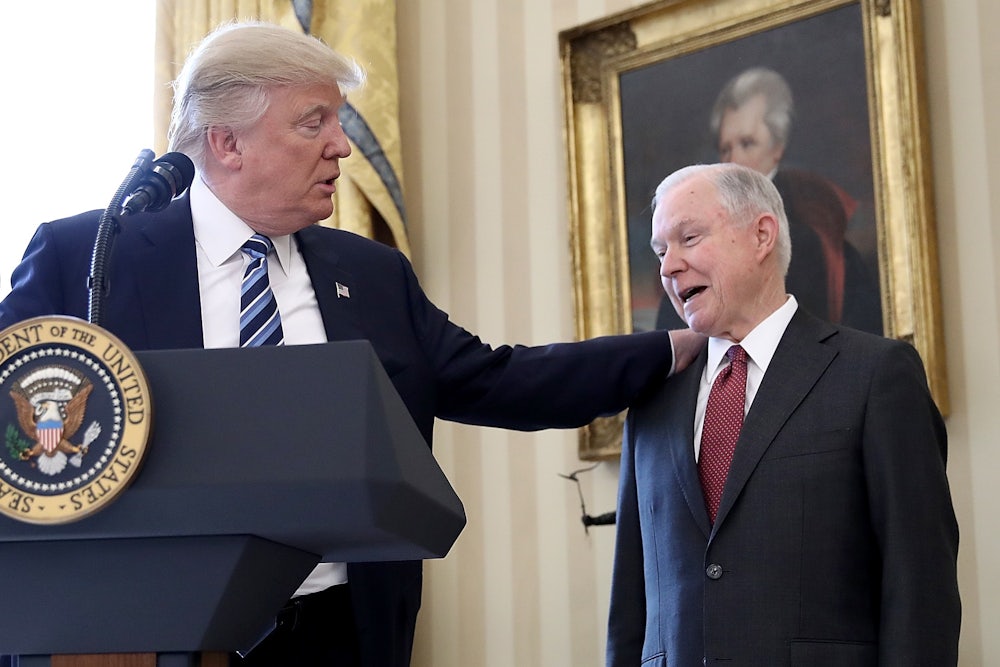It’s virtually certain that President Donald Trump will fire Attorney General Jeff Sessions by the end of the year. In an interview with Bloomberg News on Thursday, the president said he wouldn’t replace the former Alabama senator before the midterm elections—a tacit admission that it would be too politically damaging to do it any sooner. “I just would love to have him do a great job,” Trump said. “I do question what Jeff is doing.”
The White House will likely contrive a rationale to oust Sessions, perhaps by (rightly) blaming him for the family-separation immigration crisis. But the real reason for his eventual removal is obvious and irrefutable: Trump sees two federal criminal investigations—one led by special counsel Robert Mueller in Washington, the other by career prosecutors at the U.S. Attorney’s Office in Manhattan—as a dire threat to him and his inner circle. The sense of anxiety and paranoia that radiates from the president’s Twitter feed only grew after Michael Cohen, his former personal attorney, implicated Trump in campaign-finance crimes earlier this month.
Republican senators signaled last year that removing Sessions would cross a red line. South Carolina’s Lindsey Graham promised there would be “holy hell to pay” if Trump fired him, while Iowa’s Chuck Grassley, who chairs the Judiciary Committee, curtly noted that there was no room in the committee’s schedule to confirm a replacement. This month, they changed their tune. Graham told CNN earlier this week that the Senate could find a suitable replacement after the midterm elections, while Grassley acknowledged that he could find the time to approve Sessions’s successor.
There is precedent for replacing an attorney general midway through a major investigation into White House misconduct. There is also precedent for the Senate to impose conditions on an attorney general in such a scenario.
On the night of April 30, 1973, Richard Nixon tried to put the entire Watergate scandal behind him. He announced that he had accepted the resignation of two White House aides, chief of staff H.R. Haldeman and domestic-policy adviser John Ehrlichman, and fired White House Counsel John Dean. Nixon framed the shake-up as an effort to restore public confidence in his administration. “This office is a sacred trust and I am determined to be worthy of that trust,” he told the nation in a televised address.
To that end, Nixon also announced his most consequential move that night: the departure of Attorney General Richard Kleindienst, who had close personal ties to many of the Watergate conspirators. To replace him, Nixon turned to Secretary of Defense Elliot Richardson. It was a choice straight out of central casting. Richardson, a well-respected 56-year-old lawyer, had clerked for Supreme Court Justice Felix Frankfurter and served as the attorney general of Massachusetts. He was also everything Nixon was not: tall and handsome, a Yankee patrician in bearing and a Boston Brahmin in demeanor. Christopher Reeve could have played him in a movie.
Events would later prove that Richardson was not a “Nixon man,” as the president’s first attorney general John Mitchell and the rest of the Watergate conspirators had been. But Congress had no way of knowing this at the time. Richardson had already held two cabinet positions in the Nixon administration, starting with a three-year stint as secretary of health, education, and welfare. The Senate had confirmed him to lead the Pentagon only five months before Nixon nominated him to run the Justice Department. Richardson clearly appeared to be someone whom Nixon trusted.
“These are not men of detachment from outside the administration, of the type the situation requires,” The New York Times editorial board wrote after Nixon announced the executive branch shake-up. “Mr. Nixon seems to think Mr. Richardson, in particular, as a kind of totemic figure who can be moved about from one trouble spot to another as a symbol of honesty and Boston Brahmin disinterestedness.”
The immediate question after Richardson’s nomination was whether he would name a special prosecutor, and if so, whom it would be. Even then, there was precedent for selecting outside figures to run a politically sensitive federal investigation. Ulysses Grant named one to investigate the Whiskey Ring, a sprawling corruption scandal in the 1870s. Calvin Coolidge also tapped two men, including future Supreme Court justice Owen Roberts, to probe the Teapot Dome scandal in the 1920s. Nixon told the nation that he would leave the decision to name one for the Watergate scandal to Richardson.
At first, Richardson did not say whether he would appoint a special prosecutor, though he also had no signs of opposition to the idea. But as time went on, it became clear that Democrats who led the Senate Judiciary Committee would make it a condition of his confirmation process. He began a three-week search while the committee weighed his nomination. After a few candidates turned him down, he settled on Archibald Cox, a Harvard University law professor who had served as solicitor general in the Kennedy and Johnson administrations, for the job.

To further reassure senators, Richardson memorialized the scope of Cox’s duties. The special prosecutor would be authorized to investigate and prosecute all matters “arising out of the unauthorized entry into Democratic National Committee headquarters at the Watergate,” as well as “all offenses arising out of the 1972 Presidential election for which the special prosecutor deems it necessary and appropriate” and “allegations involving the President, members of the White House staff, or Presidential appointees.” He also gave him broad protections against removal. “The Attorney General will not countermand or interfere with the special prosecutor’s decision or actions,” Cox’s guidelines said. “The special prosecutor will not be removed from his duties except for extraordinary improprieties on his part.”
Finally, Richardson made an extraordinary show of deference to the Senate. Special prosecutors, both then and now, weren’t subject to its approval. But Richardson agreed to testify alongside Cox before the committee in what amounted to an informal confirmation hearing of sorts for the special prosecutor’s office. At the hearing, Cox told senators that he found both his jurisdiction and Richardson’s final control to be appropriate. “It seems to me the only authority he has retained is to give me hell if I don’t do the job,” he told the committee, “and I think he ought to keep that authority.”
The Senate confirmed Richardson to become the nation’s sixty-ninth attorney general based on that understanding. William Ruckelshaus, the acting FBI director at the time, became deputy attorney general a few months later. “I made the same pledge in September 1973 at my confirmation hearing,” Ruckleshaus wrote last summer. “At that time, only the attorney general or his successor could fire Cox.”
Shortly after Richardson’s confirmation, the American public learned about the existence of the White House taping system and its relevance to the Watergate inquiry. Cox, acting through a federal grand jury, subpoenaed the tapes almost immediately. Nixon refused to hand them over on executive-privilege grounds and challenged the subpoena in court. The D.C. Circuit Court of Appeals sided with Cox on October 13, ruling that the president was not above the law. On October 20, the White House telephoned Richardson and instructed him to remove Cox. Richardson refused and sent Nixon a letter of resignation that explained his position:
At many points throughout the nomination hearings, I reaffirmed my intention to assure the independence of the special prosecutor, and in my statement of his duties and responsibilities, I specified that he would have “full authority” for “determining whether or not to contest the assertion of ‘Executive Privilege’ or any other testimonial privilege.” And while the special prosecutor can be removed from Office for “extraordinary improprieties,” I also pledged that “The Attorney General will not countermand or interfere with the Special Prosecutor’s decisions or actions.”
While I fully respect the reasons that have led you to conclude that the Special Prosecutor must be discharged, I trust that you understand that I could not in the light of these firm and repeated commitments carry out your direction that this be done. In the circumstances, therefore, I feel that I have no choice but to resign.
Ruckelshaus resigned as well, citing the pledge he had also made to Congress. Solicitor General Robert Bork ultimately fired Cox, completing what became known as the Saturday Night Massacre. The political damage inflicted upon Nixon’s presidency was deep and irreversible. Richardson, Ruckelshaus, and Cox became icons of the American rule of law. Ten months later, Nixon became the first president to resign from office.
Why does Trump hate his attorney general? Sessions is the administration’s most effective cabinet member when it comes to crafting policy, but this isn’t enough to qualify as a “great job” in Trump’s eyes. The president has long indicated that he doesn’t care about the Justice Department’s traditional independence from the White House. He expects his attorney general to squelch investigations that could implicate him and his allies while wielding the Justice Department’s immense powers against his political opponents.
Trump hasn’t been subtle about this view, either. For more than a year, Trump has belittled and denigrated the former Alabama senator for recusing himself from the Russia investigation and all other matters related to the 2016 election. That decision set off a chain of events that placed Deputy Attorney General Rod Rosenstein in ultimate command of the inquiry. After Trump fired FBI Director James Comey, Rosenstein tapped Robert Mueller run the investigation. The president places much of the blame for the special counsel on Sessions, telling reporters last year that he wouldn’t have nominated the senator if he knew he’d recuse himself.
The American people haven’t been fooled by Trump’s pressure campaign. Sixty-four percent of them—75 percent of Democrats and 68 percent of independents, as well as almost half of all Republicans—oppose Sessions’s ouster, according to a Washington Post/ABC News poll released on Friday. This level of support gives the Senate a public mandate to protect Sessions for the remainder of the Russia investigation. If Trump fires him anyway, it also gives senators a mandate to compel Sessions’s replacement to preserve Mueller’s investigation to whatever end. Call it the Richardson rule: The Senate won’t confirm a new attorney general while the president is under investigation unless the nominee pledges to maintain the independence of that investigation—and has the integrity to uphold it.
